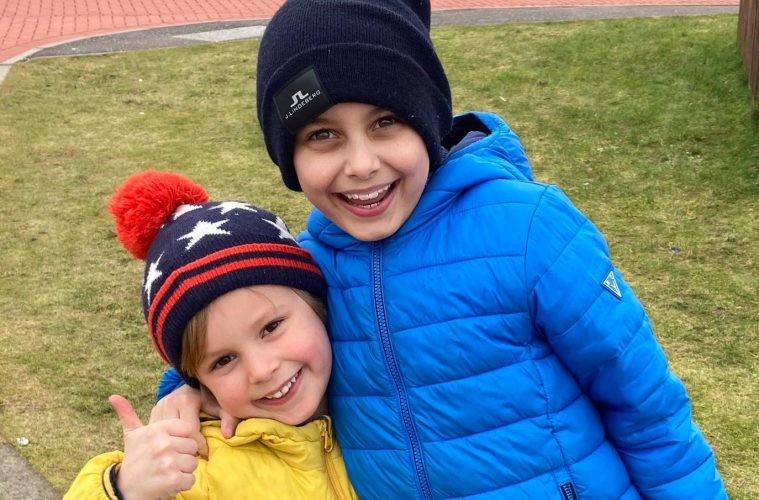Despite COVID-19, paediatric renal transplants continue at pre-pandemic levels
An eight-year-old from Elgin who developed a rare and life-threatening disease due to E.coli poisoning alongside his younger brother, is on the road to recovery after successfully undergoing renal transplant surgery at the Royal Hospital for Children (RHC) in Glasgow.
Leo McFaulds is the latest patient to undergo the surgery, thanks to his mother Louise who was an ideal match. It marks the 12th paediatric renal transplant in the past 12 months at the RHC. The service has continued throughout COVID-19 thanks to strict protocols allowing surgeries to go ahead at pre-pandemic levels.
For the McFaulds family, the successful surgery comes as a huge relief and sees Leo back on his feet and full of energy, with mum Louise also making a strong recovery.
Leo and his brother Samuel, four, were both struck down by the E. coli bug in May last year, which caused HUS. Haemolytic Uraemic Syndrome – an illness which affects the blood and blood vessels, resulting in anaemia and kidney failure. Parents, Louise and Anthony, believe they may have contracted E-coli on a countryside walk in the highlands but can never know for sure.
Falling drastically ill, both boys were hospitalised then transferred to the RHC in Glasgow for kidney dialysis. While Samuel luckily made a full recovery, Leo was in hospital for more than two months before being moved onto three times weekly kidney dialysis in August, with the family relocating to Glasgow to be near the hospital and family. Fortunately, however, Louise was quickly identified as a potential match for Leo and the operation was scheduled for the middle of February.
Louise said: “To have both boys struck down with the same illness and both having lifesaving treatment at the same time was harrowing. It was an awful time for our family as it came on so suddenly. Thankfully Samuel recovered relatively quickly, but Leo went from being a typical happy, healthy boy, who played in the garden with his brother and attended school, to being completely hospital-bound and unable to fully engage with normal life. But his bravery and optimism through this has been inspiring.
“I was naturally over the moon when we found I was a match, and despite the pandemic, from then on everything in the transplant work up process seemed to go like clock-work. The team at the RHC were determined to get the transplant completed as soon as possible. We know the NHS have been under enormous pressure because of COVID-19 but never once did we feel Leo’s care had been compromised in any way and I think that’s testament to the professionalism of staff at the RHC. We will always be grateful to the wonderful renal surgeons, doctors and nurses there.
“The Glasgow Hospital Children’s Charity was also a huge support to us when Leo was in hospital, helping keep him entertained and keep his mind off his illness during his stay.”
Leo, who received the transplant on February 10th is already looking forward to rejoining his classmates back at school, and although he will face challenges in the future, Louise is optimistic:
“Leo will always have kidney disease, and Samuel and myself will have follow up for some time to come. We know there will be bumps in the road ahead, but to look back six months, to compare where we are now it’s a miracle really. Leo now has his life back and we’ll be counting the small milestones – going back to school, going swimming and maybe even a holiday – as victories and we will never take any of these happy family moments for granted in future.”
Dr Ben Reynolds, consultant paediatric nephrologist at NHS Greater Glasgow and Clyde, who leads the transplant service, said:
“It is fantastic to see Leo recovering well and full of energy again, full of eight- year-old mischief and silliness. At RHC we’re lucky to be one of only two children’s kidney transplant centres in the UK able to maintain a full schedule of renal transplants throughout the pandemic. This is so important for children like Leo where there is a well matched donor, and the operation means we can get them off dialysis and back to as normal a life, as quickly as possible.
“Transplant is almost always the best thing for any child on dialysis. The change to the kidney opt-out scheme in Scotland at the end of the March still relies on people registering their wishes. We would always encourage anyone to discuss this with their families and loved ones about giving “the gift of life.””


